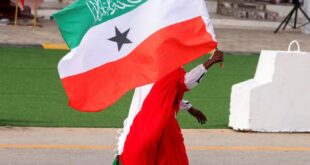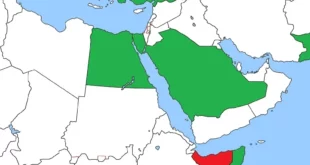On 25 July, Tunisia’s President Kaïs Saïed invoked the constitution to seize emergency powers after months of crisis. In this Q&A, Crisis Group expert Riccardo Fabiani says compromise between Saïed and his parliamentary opponents remains possible, but so does grave violence.
What has happened in Tunisia?
Late on 25 July, following a day of rowdy demonstrations that included reports of looting, President Kaïs Saïed invoked the constitution’s Article 80, which grants the president augmented powers in emergency situations, citing as his justification the collapse of many public services and destruction of government property. Saïed also “froze” parliament for 30 days, revoked legislators’ parliamentary immunity and seized control of the public prosecutor’s office. The next day, he cited the same article to dismiss by presidential decree Hichem Mechichi, the prime minister and interim interior minister whose nearly one-year tenure had become marked by increasing paralysis as the country grew more polarised, as well as the defence, justice and civil service ministers.
These actions have triggered the worst political crisis in Tunisia since the 2011 revolution that brought down its autocratic leader, Zine al-Abidine Ben Ali, in the first of the Arab uprisings. An angry rejection of President Saïed’s move came immediately from his main political opponent, Rached Ghannouchi, the speaker of parliament and head of the Islamist Ennahda Party, Tunisia’s largest, who called the move a “coup against the revolution”. Other parties allied with Ennahda and representing a majority of seats in parliament also cried foul, arguing that Saïed’s seizure of emergency powers was unconstitutional on two grounds: first, they claimed that he had not fulfilled the requirement to inform the parliament speaker and prime minister prior to invoking Article 80; and secondly, they said he exceeded his constitutional powers in freezing parliament (which Article 80 foresees operating in permanent session alongside the president in emergencies) and stripping deputies of immunity, as well as in taking control of the public prosecutor’s office.
Now there is a serious risk of further confrontation. The direction of events is uncertain, and the president’s action feels like a leap into the unknown.
Popular participation in events in the first 24 hours went through three phases. The first was a wave of rioting in several cities that preceded Saïed’s announcement on 25 July. The rioters were not clearly associated with any single political party, and their ranks included soccer hooligans and other unruly elements. These rallies took on a markedly anti-Islamist flavour, with crowds raising chants blaming Ennahda for the 2013 assassination (allegedly by Salafi jihadists) of two leading Tunisian left-wing secularists, Chokri Belaïd and Mohamed Brahmi. The mobs targeted the Ennahda offices in Monastir, Sousse, Sfax, El Kef and Tozeur, reportedly engaging in looting.
In the second phase, which began later that day, after Saïed announced his power grab, the character of demonstrations changed to one of celebration among more middle-class Tunisians, especially in the capital Tunis, with people dancing, singing the national anthem and shouting: “Long live the president!”
The third phase came the next morning, on 26 July, when the mood turned tense as Ennahda supporters trying to gain access to parliament were stopped by security forces. Demonstrators threw stones and bottles, and a few people were wounded by gas canisters and projectiles.
” While clashes between supporters of the two camps have so far been limited, the risk of an escalation of violence over the coming days cannot be ruled out “
While clashes between supporters of the two camps have so far been limited, the risk of an escalation of violence over the coming days cannot be ruled out. The president’s next decisions (were he to use corruption arrests against parts of the political and business class, as his takeover of the public prosecution office and his apparent policy priorities might indicate, or order the security forces to arrest key opposition figures, for example) and the opposing side’s reactions (potentially mobilising their own networks against Saïed on the streets) will be crucial.
Was what happened a coup?
While President Saïed’s opponents say his manoeuvres were extra-constitutional and thus amount to a coup, or a “constitutional coup”, Saïed pointed to the constitution itself, lecturing his detractors to educate themselves by taking some law classes. (He was a constitutional law professor before being elected president.)
But whether or not Tunisians and foreign governments deem Saïed’s 25 July action a coup, it was clearly an orchestrated power grab. His close circles had spoken months ago about his desire to invoke Article 80 of the constitution. The demonstrations that framed his actions themselves looked provocative and may well have been pre-planned, even if nurtured by the frustrations of impoverished citizens. A recent controversy surrounding a transitional justice financial compensation of Ennahda activists who suffered during Ben Ali’s era had recently stoked further popular anger.
The military has been involved, but only up to a point. Once Saïed invoked emergency powers under the constitution, the army moved quickly to seal off parliament and took control of the headquarters of the state radio-television broadcaster. So far, however, that is the extent of the military’s muscle flexing. There has as of yet been no wave of arrests of opponents, though there are rumours of thousands of politicians and senior officials being prevented from leaving the country, which could indicate future arrests.
What is the main cause of Tunisia’s political polarisation, and will Saïed’s actions resolve or exacerbate it?
Saïed soared to power in 2019 with 73 per cent of the vote, buoyed by his promises to fight corruption and rebuild state sovereignty, which Ennahda supported at the time. But despite this large popular mandate, he argued that he was unable to govern properly due to other parties’ control of parliament and Tunisia’s political system, which empowers both president and parliament. Mechichi, the prime minister whom Saïed himself had put forward in September 2020, increasingly distanced himself from the president, to the point that in January 2021 he dropped the president’s nominee for the all-powerful interior minister position. Even worse polarisation and paralysis ensued, as Saïed refused to allow the swearing-in of the new government.
” Saïed claims to be strengthening his hold on power so as to break the country’s political impasse “
This deadlock has exacerbated popular anger at a series of pre-existing and more recent problems, which gave Saïed a pretext for his 25 July announcement. These include the public’s ever-increasing loss of confidence in legislators and political parties; rising living costs; the socio-economic consequences of repeated border closures with Algeria and Libya; a series of lockdowns and curfews aimed at limiting the spread of COVID-19, which have failed to reduce the number of new cases and deaths; and a general sense that institutions are dysfunctional. Saïed claims to be strengthening his hold on power so as to break the country’s political impasse, and to be addressing the socio-economic crisis. But the cost may be very high – potentially even the end of Tunisia’s post-2011 experiment with parliamentary democracy.
It is not impossible that Saïed succeeds in establishing a new status quo. In what undoubtedly will be a stiff battle of messaging at home and abroad, Ennahda and its parliamentary allies will hold up the banner for parliamentary politics and democratic process, while Saïed will stress his promises to end corruption and make the state strong and effective. His enduring popularity among some parts of Tunisian society suggests that at least some citizens want power in the hands of a strongman who they believe can make the state work better. By supporting an anti-corruption campaign against officials and businessmen tied to Ennahda, for example, he could permanently weaken some of his strongest political rivals.
Still, there are plenty of other scenarios that are at least as plausible, given the potential opposition to Saïed. It remains unclear whether the public administration, business circles, professionals, political parties and civil society groups will collaborate with or resist the president’s next moves. A second important factor will be the profiles of the people he chooses to advise him and to fill the state’s key positions, as they will help define his policy priorities and their execution. Third will be the reaction of international financial institutions, rating agencies and creditors, which could widen or narrow Saïed’s room for economic manoeuvre.
The economy is in dire shape, with a contraction of 8.8 per cent and a fiscal deficit of 11.4 per cent of GDP. The pandemic has exacerbated these problems, with hundreds of deaths per day and severe restrictions on movement. The country desperately needs international loans to balance its budget, and it is not clear where the money will come from. Saïed will inevitably be forced to adopt austerity measures, which will likely prove unpopular. This reinforces the likelihood that the 25 July events signal a turn toward more authoritarian rule.
What are the regional dimensions of the crisis?
Tunisia is a small country of 11 million people, much weakened by economic disruptions since the Arab uprisings, the latest political stalemate, mismanagement of the COVID-19 response and the decline of tourism. It is thus unusually dependent on the policies and support of its larger, often richer North African neighbours – notably Algeria, Egypt and Libya – as well as the Gulf Arab states and the former colonial power France just across the Mediterranean. All these countries pursue their own agendas vis-à-vis Tunisia.
Many in Tunisia accuse outsiders of having a hand in recent events. Ennahda officials, for example, tend to blame the first wave of anti-Ennahda demonstrations on 25 July on the United Arab Emirates (UAE), noting that the Emirati satellite television network Al Arabiyya broadcast images of demonstrators live and at length, making it look like there were large masses blaming the party for a decade of mismanagement and assassinations of secularist and leftist politicians. Meanwhile, the widely watched Al Jazeera network called upon Tunisians to rally to the defence of “revolution and democracy”. Al Jazeera is based in Qatar, a Gulf Arab rival to the UAE that has long supported the Muslim Brotherhood, a movement that inspired Ennahda’s founders. Shortly after Al Jazeera broadcast its call, police stormed its offices in Tunis and closed them down. Some Tunisians also noted that in April, Saïed visited Egypt, where he voiced support for the policies of President Abdel Fattah al-Sisi, who crushed the Muslim Brotherhood after taking power in 2013 and is often seen as part of a regional anti-Islamist axis and close to the UAE. For them, Egypt is a clear supporter of Saïed’s move.
” The current crisis owes more to deteriorating living conditions and political deadlock than to the role of outside players “
In reality, though, domestic factors offer a better explanation for the recent developments than regional politics. While in the past external actors have interfered with and aggravated pre-existing tensions, the current crisis owes more to deteriorating living conditions and political deadlock than to the role of outside players.
Is there anything the world can do to promote a peaceful resolution of the situation in Tunisia?
Everything is in flux. Tunisia’s main social and economic actors, including lawyers’, judges’ and journalists’ professional associations, are calling for respect of the constitution’s fundamental tenets. The General Union of Tunisian Workers (known by its French acronym, UGTT), the powerful and broadly representative federation of trade unions, has demanded that the president specify the goals and duration of the exceptional measures.
Most countries are aware of the nuances of Tunisia’s predicament and are unwilling to rush in to act or even comment. While Turkish officials have condemned the president’s move, others, including France, the European Union (EU), the African Union and the U.S. – all of which are influential in Tunisia – have avoided taking a clear stance on these events, instead preferring to encourage all parties to stick to the constitution, without passing judgment on whether Saïed’s power grab was constitutional, and avoid violence.
Outside powers should put as much pressure as possible on those interlocutors who listen to them to avoid polarising things further and risking violence. In particular, France, the U.S., the EU and Germany should take a tougher line, even if behind the scenes. They should push the president to publicly commit to a roadmap detailing what he intends to do during this period and to re-establishing normal democratic processes, including parliament’s constitutionally defined role, no later than October, when parliament returns from recess. The U.S. and EU have already made statements to this effect. They should urge him to regularly consult the country’s main political, social and economic groups, including opening talks with his rivals, during this emergency period and to operate within the constitution’s limits. They should send clear signals that crackdowns against opponents or the misuse of corruption trials would run against serious foreign opposition.
 Eurasia Press & News
Eurasia Press & News


